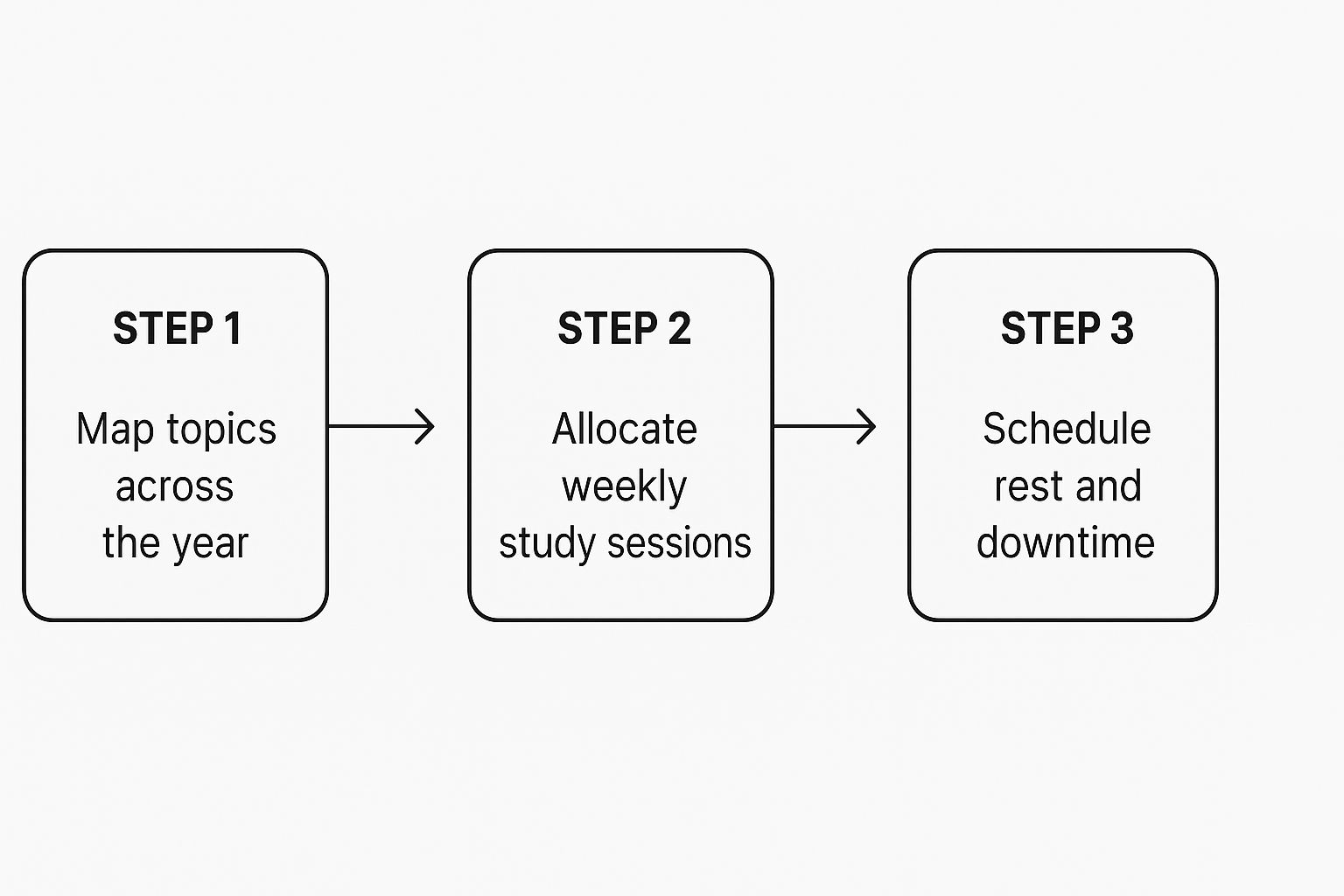Revising for A Level Biology can feel daunting, but it's all about having a smart, sustainable plan that works for you. It's about breaking down that massive syllabus into chunks you can actually handle, creating a revision experience that feels supportive, not stressful. The trick is to build a solid revision foundation right from the start by mapping out topics, scheduling regular study sessions, and—most importantly—looking after yourself. This approach flips the script from overwhelming stress to a clear, manageable path forward where you feel in control.
Building Your Biology Revision Foundation
Let's be honest, staring at the A Level Biology syllabus can feel like standing at the bottom of a mountain. It’s a huge amount of information, covering everything from the microscopic world of cellular respiration to the sprawling complexity of ecosystems. It’s completely normal to feel a bit lost, anxious, or overwhelmed by the sheer volume of it all.
But the secret isn't about cramming more hours into your day; it's about revising smarter, in a way that protects your wellbeing. This whole process starts by creating a realistic study plan that actually fits into your life, not the other way around. We're aiming for a sustainable pace that prevents burnout and builds real confidence, not last-minute panic.
Creating a Sustainable Study Plan
A well-organised schedule gives you structure and cuts down on that gnawing anxiety of not knowing where to start. Begin by mapping out all the biology topics you need to cover across the academic year. Then, break them down into smaller, bite-sized chunks.
For example, instead of a vague goal like 'Revise Genetics', which can feel huge, break it down into manageable tasks: 'Draw and label DNA structure', 'Explain the stages of Meiosis', 'Solve three Monohybrid inheritance problems'. Suddenly, the content feels far less intimidating. To really nail your biology foundation, it's also vital to get your head around the fundamental difference between viruses and bacteria, as this concept crops up everywhere.
This simple infographic shows you the core process of creating a balanced revision schedule that puts you at the centre.

As you can see, the flow from mapping topics right through to scheduling rest shows that effective revision is a holistic process. It's not just about the hours you put in at your desk; it's about creating a system that supports your learning and your mental health.
Balancing Your Subjects and Wellbeing
Getting your revision time organised is a game-changer for your A Level success and peace of mind. A good rule of thumb is to dedicate around 6-8 hours per week to Biology during term time. This will likely ramp up to 12-15 hours a week as you get closer to the exams.
Consistency is what separates the top students. It's no coincidence that a significant portion of the 27% of students who achieve an A or A* rely on this kind of steady, planned-out approach. It builds knowledge brick by brick, avoiding that awful end-of-year cramming session.
Here’s a practical example of how you could structure a week, balancing Biology with two other subjects and making sure you get that much-needed downtime to recharge.
Sample Weekly Biology Revision Timetable (Term Time)
| Day | Morning (Before School) | Afternoon (After School) | Evening |
|---|---|---|---|
| Monday | Biology (1 hr) – Topic A Recap & Flashcards | Subject 2 (1.5 hrs) | |
| Tuesday | Biology (1 hr) – Past Paper Questions (Topic A) | Subject 3 (1.5 hrs) | |
| Wednesday | Sport / Club / Free time | Biology (1 hr) – Review Tuesday's work | |
| Thursday | Subject 2 (1.5 hrs) | Biology (1.5 hrs) – Topic B New Content | |
| Friday | Free time / Socialising | Free time / Relax | |
| Saturday | Biology (1.5 hrs) – Topic B Past Paper Practice | Free time | Socialising / Hobbies |
| Sunday | Subject 3 (1.5 hrs) | Plan week ahead / Relax |
This is just a template, of course. The key takeaway is to schedule your sessions—including your breaks—and treat them like any other important appointment. Your brain needs downtime to consolidate information.
Remember, feeling guilty about taking a break is a trap. Scheduling breaks, exercise, and social time isn't a luxury—it's an essential part of an effective revision strategy. It prevents burnout and improves memory retention, helping you walk into your exams feeling refreshed and ready.
By planning ahead, you put yourself in control. You can see your progress, spot tricky topics early, and most importantly, protect your mental health. This structured approach is central to effective revision for A levels in any subject, but it's especially vital for a content-heavy science like Biology.
Active Revision Techniques That Actually Work

Let's be honest, covering a page in highlighter might feel productive, but it rarely helps complex biological information stick. It can create a false sense of security, where your brain just sees a pretty colour, not the intricacies of the Krebs cycle. It’s time to move beyond these passive habits and embrace active revision—methods that force your brain to actually grapple with the material.
This is all about shifting from simply reading to actively retrieving information from your memory. It's the difference between recognising a term and being able to explain it from scratch. This mental workout is what builds strong, lasting neural connections—the kind you need when the exam clock is ticking and your heart is pounding.
Harness the Power of Active Recall
Active recall is just what it sounds like: deliberately trying to remember information without looking at your notes. It’s a simple concept, but its impact on your memory and confidence is huge. Instead of rereading a chapter on meiosis for the fifth time, you close the book and try to sketch out the stages yourself. It will feel harder, but that's the sign that it's working.
This is where traditional study methods often fall flat. In fact, surveys now show that over 60% of students find active recall methods, like flashcards and practice questions, far more effective for biology revision than just reading. This reflects a wider shift in A Level Biology itself, which now demands deep conceptual understanding over rote memorisation. You can discover more insights about A Level trends and outcomes to see just how much the exams have evolved.
Here are a few practical ways to put active recall into practice:
- Flashcards: Go old school. Create cards with a key term (e.g., "Allopatric Speciation") on one side and a detailed definition, including a specific example ("e.g., Darwin's finches on the Galápagos Islands"), on the other. Test yourself regularly.
- Blurting: After studying a topic like glycolysis, grab a blank piece of paper and write down everything you can remember. Don't worry about structure, just get it all out. Then, compare it to your notes. The gaps you see aren't failures; they are signposts showing you exactly what to focus on next.
- Practice Questions: Don’t just save these for mock exams. Consistently tackling questions from textbooks or past papers trains your brain to retrieve and apply knowledge under pressure.
Simplify to Understand with The Feynman Technique
The Feynman Technique is a brilliant way to test how well you really understand something, and it's perfect for conquering that feeling of self-doubt. It’s built on a simple idea: if you can’t explain a concept simply, you don’t understand it well enough.
Imagine you have to explain the human immune response to a younger sibling or a friend who doesn’t study biology. Could you break down the roles of lymphocytes, phagocytes, and antigens without falling back on confusing jargon? Could you use an analogy, like comparing T-cells to 'generals' that coordinate the attack?
Trying to teach a concept is the ultimate test of your own knowledge. It immediately exposes the gaps in your understanding, forcing you to go back and solidify those weak points until the explanation flows naturally. That moment when it finally 'clicks' is a huge confidence booster.
This method is incredibly powerful for complex processes in A Level Biology. If you stumble while explaining transcription and translation, you know exactly which part of the process you need to revisit. It moves you from passively remembering facts to actively constructing knowledge—the absolute key to mastering biology revision and achieving those top grades.
Using Past Papers to Master Exam Technique
Knowing your biology is only half the battle; performing under exam pressure is a skill in its own right, and it's something you can learn. This is where past papers transform from a dreaded task into your greatest training tool. They're so much more than a way to test what you know—they are your secret weapon for mastering exam technique and walking into that hall with confidence.

This process isn't about getting everything right the first time. It's about slowly turning the fear of the unknown into a feeling of familiarity. By working through papers, you begin to see the patterns, understand what examiners are really looking for, and build the resilience you need to perform at your best when it counts.
Decoding Command Words and Mark Schemes
Have you ever lost marks on a question you were sure you knew perfectly? It's a deeply frustrating feeling. The culprit is often a misunderstanding of the command word. These are the crucial verbs at the start of a question that tell you how to answer it.
Getting these right is the key to unlocking marks. Think of it this way:
- Describe: This is asking for a play-by-play. For a question on mitosis, you would state the events of prophase, metaphase, anaphase, and telophase in order. Simple.
- Explain: This demands the ‘why’. You wouldn’t just list the stages of mitosis; you’d explain why the chromosomes line up at the equator or why the spindle fibres contract.
- Evaluate: This requires you to be the judge. You need to weigh up the pros and cons of a concept, like using stem cells, and come to a supported conclusion.
The best way to get a feel for this is by working backwards. After you attempt a question, grab the mark scheme. Don’t just check if you were right or wrong; analyse the specific language it uses. You'll quickly realise that certain keywords and phrases (like "due to osmosis" or "forming an enzyme-substrate complex") are rewarded with marks, time and time again.
The Power of Timed Practice and Brutal Honesty
It feels safe to do past papers with your textbook open beside you, but this creates a false sense of security. The real growth, the kind that builds genuine confidence, happens when you simulate exam conditions. Start with individual questions, then build up to full papers under strict timing—a good rule of thumb is roughly one minute per mark.
This will feel uncomfortable at first. You might run out of time or panic. That’s okay. This is the point where you learn to manage your time, make quick decisions under pressure, and stay calm.
Once you're done, you have to mark your work with brutal honesty. It's so tempting to give yourself the benefit of the doubt, but that won't help you improve. If your answer doesn't match the mark scheme's wording, don't award yourself the mark. This strict approach is vital for understanding exactly where your gaps are. Understanding how strict marking can be is also useful when you want to learn more about A Level grade boundaries and what it takes to achieve a certain grade.
Create a 'mistake log' in a notebook or spreadsheet. For every mark you lose, write down the topic, why you lost the mark (misread the question, knowledge gap, poor wording), and the correct answer. This log becomes your personalised revision guide, focused entirely on your weakest areas. It transforms mistakes from something to be feared into your most powerful learning tool.
This targeted approach stops you from wasting time going over topics you already know well. Instead, you can focus your energy precisely where it will make the biggest difference, systematically turning weaknesses into strengths.
How to Tackle Difficult Topics and Practical Skills

Every biology student has that one topic that makes their heart sink. For some, it’s the dizzying web of biochemical pathways like respiration; for others, it's the sudden appearance of maths in statistics. It’s completely normal to feel stuck, but these topics aren’t impossible mountains to climb.
Feeling overwhelmed by a complex process is a sign you need a new perspective. Instead of just rereading the textbook and feeling more confused, let’s try to demystify these common hurdles with targeted strategies. The goal is to turn that feeling of confusion into a quiet click of understanding.
Making Complex Processes Click
Biochemical pathways like respiration or photosynthesis can feel like learning a foreign language. The key is to make them visual and relatable. Don’t just read the steps; draw them.
Use simple analogies to anchor the concepts. For example, think of the ATP synthase enzyme as a revolving door or a water wheel. Protons (H+ ions) passing through are like people pushing the door, providing the energy to turn it and generate ATP. This simple mental image is far more memorable than a dry definition.
Break the process down into smaller, story-like chunks:
- Glycolysis: The initial "splitting" of glucose in the cytoplasm. The first act of the play.
- Link Reaction: The "taxi ride" for the products to get into the mitochondria. A transition scene.
- Krebs Cycle: The "engine room" where key molecules are generated, spinning round and round.
- Oxidative Phosphorylation: The "production line" where the bulk of ATP is made. The grand finale.
Conquering the Maths in Biology
Mathematical skills are worth up to 10% of the marks in your A Level Biology exams, so you can't afford to ignore them. Statistical tests like the Chi-Squared test often cause panic, but they are just tools with a clear purpose.
Focus on understanding the ‘why’ behind the formula, not just memorising the steps. The Chi-Squared test, for example, is simply a way to compare the results you actually got in an experiment (observed) with the results you thought you’d get (expected). It tells you if the difference between them is significant or just down to random chance.
When you tackle a Chi-Squared question, narrate the process to yourself like a story. "Okay, first, I need to figure out what results I expected to see. Next, I'll find the difference between that and what I actually saw in my experiment. Now, I'll use the formula to get my Chi-Squared value and compare it to the critical value in the table to see if my results are meaningful." This makes the process a logical sequence rather than a scary formula.
If you find yourself consistently struggling with these trickier areas, exploring options like online science tutoring can provide that personalised guidance to help things fall into place. It’s no surprise that with over 65,000 students taking A Level Biology in the UK recently, mastering these skills is what separates good grades from the top ones. Recent data shows that around 27.6% of entries achieved an A* or A, a testament to what focused revision can achieve. You can learn more about recent A Level result trends on GOV.UK.
Managing Stress During the Final Countdown
https://www.youtube.com/embed/VZTGBj7Zyvk
All your hard work deserves a chance to shine on exam day, but relentless revision without a break is a recipe for burnout, not success. In this final stage, your wellbeing is just as important as understanding glycolysis.
It’s easy to get sucked into the belief that every waking moment should be spent with your head in a textbook. In reality, that's completely counterproductive. Your brain needs downtime to process what you’ve learned and actually lock it into your long-term memory. Pushing through exhaustion just leaves you feeling foggy, frustrated, and unable to recall the very information you’ve spent weeks learning.
The final weeks are a test of endurance as much as knowledge. Protecting your mental and physical health isn't a distraction from revision; it's the foundation of it. A calm, rested mind will always outperform a stressed, exhausted one. Remember to be kind to yourself.
Feeling a surge of anxiety before an exam is completely normal, but having a few practical tools to manage it can make a world of difference. You don't need a complicated routine; simple actions can have a huge impact.
Building Your Exam Wellbeing Toolkit
Think of your wellbeing as a non-negotiable part of your revision timetable. These aren't luxuries. They are essential strategies to make sure you walk into that exam hall feeling prepared and in control, ready to show the examiner everything you know.
Here are a few practical tips to keep you balanced:
- Prioritise Sleep Over Cramming: Sacrificing sleep for a few extra hours of frantic revision is one of the biggest mistakes you can make. It's during deep sleep that your brain strengthens all the neural connections you’ve made while learning. Honestly, a good night's rest is one of the most powerful revision tools you have.
- Try the 5-4-3-2-1 Grounding Technique: If you feel that panic rising in your chest, just pause. Name 5 things you can see (your pen, a poster, a cloud), 4 things you can touch (your desk, your jumper), 3 things you can hear (a clock, traffic), 2 things you can smell (your tea, fresh air), and 1 thing you can taste. This simple trick yanks your focus back to the present moment and helps quieten those anxious thoughts.
- Fuel Your Brain: Your brain is an energy-hungry machine. Eating regular, balanced meals with plenty of protein, fruit, and vegetables will sustain your concentration far better than living on sugar and caffeine. Don't forget to stay hydrated with water throughout the day, too.
- Move Your Body: You don't need to run a marathon. Just a 20-minute walk outside can lift your mood, slash stress hormones, and give your cognitive function a welcome boost. Schedule it into your day just like any other revision session.
During this intense period, managing your stress levels is vital. It’s worth exploring effective strategies to reduce chronic stress, which always includes prioritising proper rest. Remember, looking after yourself is how you ensure all your incredible effort pays off.
Got Questions About A Level Biology Revision? We’ve Got Answers.
It’s completely normal to have questions swirling around as you navigate A Level Biology revision. You’re trying to juggle a huge amount of information while also looking after yourself, so feeling a bit unsure about the best way forward is part of the process.
Think of this as your go-to guide for those nagging worries. We’re going to tackle some of the most common questions students just like you ask, so you can feel more in control and confident in your approach.
How Many Hours a Day Should I Revise for A Level Biology?
Honestly, there’s no magic number here. What works for one person won't necessarily work for another. It’s far less about the hours you clock in per day and much more about consistency over time.
A good benchmark during term time is to aim for around 6-8 hours per week of dedicated Biology revision. This keeps things steady and stops you from feeling overwhelmed.
As exams get closer, say during the Easter holidays, you might ramp this up to 12-15 hours a week. But the most critical part is how you use that time. Break it down into focused sessions of 45-60 minutes.
The real secret? Quality over quantity. Two hours of genuinely focused, active revision—like blurting or tackling past papers—is infinitely more valuable than four hours of passively flicking through your notes with your phone buzzing beside you.
Listen to your body and brain. If you feel your concentration slipping and you're just not taking anything in anymore, that’s a clear sign you need a break, not more pressure. A well-structured, realistic timetable will be your best friend.
What Is the Best Way to Memorise All the Content?
First, let's shift the goal from pure memorisation to genuine understanding. It’s a subtle but powerful change. Once you understand a concept, remembering it becomes so much easier. That said, some rote learning is just part of the A Level Biology beast.
The key is to use methods rooted in active recall, which means forcing your brain to pull information out, not just passively recognise it.
Instead of reading definitions until your eyes glaze over, get active:
- Flashcards: Go old school with physical cards or use a digital app like Anki. The crucial part is to test yourself regularly and say the answers out loud.
- Spaced Repetition: This is an absolute game-changer for long-term memory. You review new topics often at first, then at increasingly longer intervals—maybe after one day, then three days, then a week. This process is proven to cement information in your long-term memory.
- Mnemonics and Acronyms: Don’t be afraid to get silly. Creating memorable sentences or words is a classic for a reason. For example, to remember the order of taxonomic ranks (Kingdom, Phylum, Class, Order, Family, Genus, Species), you could use: "King Philip Came Over For Good Soup".
- Link New to Old: Always try to connect new information to something you already understand. When learning about the heart, don’t just read about it. Grab a diagram, physically trace the path of blood with your finger, and explain each step out loud as if teaching someone else. This builds much stronger neural pathways than just reading a block of text.
I Keep Running Out of Time in Biology Exams. What Should I Do?
This is a really common fear, and trust me, it’s almost always a problem you can solve with practice and strategy, not by trying to write faster. The trick is to build up your exam stamina and sharpen your time management before you even walk into that exam hall.
Start by doing sections of past papers under timed conditions. A good rule of thumb is to allow about one minute per mark. So, a 5-mark question should take you around five minutes.
When you first open the paper, give yourself one minute to scan all the questions. Get the lay of the land. It’s often a great idea to tackle the questions you feel most confident about first. This builds momentum, calms the nerves, and banks you some easy marks.
For those hefty long-answer questions, spend 30 seconds scribbling a quick bullet-point plan before you start writing. This forces you to structure your answer, keep it concise, and make sure you hit all the key marking points without waffling. If you practise this enough, it’ll become second nature.
And if you get truly stuck on a question? Move on. It is so much better to secure marks on other questions than to waste five precious minutes agonising over a single tricky point. You can always come back to it if you have time.
At Queens Online School, we understand that every student's learning journey is unique. If you're looking for a supportive and structured environment with expert teachers to guide you through A Level Biology, explore our flexible online programmes at https://queensonlineschool.com.

